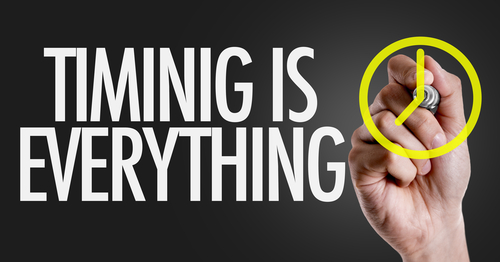WHY ignites motivation.
WHAT clarifies outcomes.
HOW is the process.
but
WHEN is your point of difference!
There is no doubt that we should all start at WHY. WHY sparks the motivation for change that shapes your beliefs and defines your identity, which is critical for behavioural change. But in my opinion, if you do not get the WHEN right, the WHY along with your motivation will disappear behind a sea of inevitable set-backs, energy dips, failures, rejections, hurts and disappointments.
Timing is everything.
If you get your timing wrong you are more likely to fail or get rejected; whether it is the time of day you wake, eat, sleep, exercise, work, and even initiate sex with your partner. Timing is critical. You may think you are not good at something, when in fact you just did it at the wrong time of day that is not aligned with your optimal chrono-type.
Munich University pioneered the research into discovering your chrono-type with a simple quiz but if you really think about it, you would know intuitively whether you are a morning person or a night owl. The research shows that approximately 30% of people are ‘morning’ types, 30% are ‘night owls’ and 40% are in-between. Most modern work schedules favour the morning types. I know some people who have gone into business for themselves purely so they can be in control of when they eat, sleep and work. Others have asked their boss if they can work different hours that favour their chrono-type. If you don’t have the privilege of either, don’t despair. Read on….
8 Tips to Get Your timing right?
Using the Higher Branch framework, consider how you can get your timing right in the following 8 AREAS of life. These tips can make a huge difference to your energy, motivation and performance.
Health
There are three branches to your physical health. Nutrition, sleep and movement (exercise). Sleep is by far the most important factor for your cognitive performance, emotional happiness, immunity and longevity.
If you are a night owl, going to bed early may cause you to slip into self-induced insomnia as you lie awake trying to get to sleep before you are ready. You start developing a negative association with your bed and it’s a spiral into anxiety from there that causes more insomnia. If your optimal time to go to bed is 11pm and wake at 7am then stick to that and be true to your chrono-type. If you prefer to sleep at 9pm and wake at 5am then go with that.
When it comes to eating, typically morning people can’t survive without breakfast, while night owls prefer to snack at night and fast till midday the next day. Some can have one or two meals per day, others are primed for grazing throughout the day. For some, exercise first thing boosts their energy level, for others midday or late afternoon is the best time.
Don’t try and be something you are not. You need to listen to your body. And if you cannot figure out what your body is telling you then maybe it is time to have an Ayurvedic or a genetic consultation with a peak performance coach. We recommend Mark Bunn, Alessandra Edwards and Anthia Koullouros.
Love & Intimacy
Couples can sometimes think they have relationships ‘problems’ simply because they have their timing all wrong. For example, if you try to initiate sex with your partner late at night and they are a morning person, then you are setting yourself up for rejection. So, it is important to get your timing right. How do you do that? Start with sleep. In a previous article The Sex/Sleep Connection I talked about how important sleep is to a relationship.
Family
If you are a morning person, then the best time to spend with your children is in the morning. Driving them to school is a great way to do that. Otherwise, I know some parents who wake early and go jogging or swimming with their children. If they are too young, then a playground is an awesome way to start the day. If you are a night person, then flip that around and do those things later in the day. Pick them up from school. Read to them at night. Play board games. Please don’t watch TV or have any screen time at night with your children. Artificial light at night will mess up their sleep and yours whether you are a morning person or a night person. More on the importance of your circadian rhythm in the next article.
Work
If you are a morning person you need to do your most important work in the first 90 minutes after you start work. Why only 90 mins? Research shows that after 90 minutes, your attention span and focus deteriorate, and you need a 15 min break outside in sunlight to reset. Why the first 90 mins? For a morning person, the first 90 minutes at work is the most productive. This should never be spent checking email! Or in meetings, unless the meeting is for brainstorming or decision making. The converse is true for a night person. You need to ease into the day and do your best work later in the day when your brain comes alive.
Friendships
Socialising is a critical element to our wellbeing. In fact, all the research shows that the longest living humans in the blue zones of the world all have very strong social networks that keep them happy and mentally sharp. Friendships help us have fun and bring laughter to our life. BUT only when you socialise at the right time. If you are a night person then going out at night to the footy or a bar or restaurant brings the best out of you. You will be a lot more fun and energetic. If you are a morning person, then perhaps you should avoid going out at night and choose a morning cycle and coffee or a long lunch on weekends. Timing can be the difference between being perceived as fun or boring.
Learning
At A Higher Branch we consider learning to be an essential element for growth. Our whole mission is built around sharing actionable knowledge with our community. Learning is not just about attending seminars about your subject-matter expertise. But more importantly about your personal life. Your health, how to be a better partner, friend or parent and all the 8 areas of life. And learning is no different to working. You should read, listen or watch when you are most alert. Again, this leads back to whether you identify yourself as a morning person, a night person or an in-between. The best ways to learn on the fly is during your daily commute. Some call it ‘Traffic University’. By far the most effective exponential way to learn is face-to-face at seminars and events with other like-minded people.
Wealth
Your appetite for risk varies according to the time of day. If you are a morning person, then the worst time for you to make investment decisions is later in the day when you are more emotional and prone to impulsiveness. The converse is true for night owls. The morning is your worst time to make investment or business decisions.
Charity
Helping others, whether it is the new person at work or a friend that needs someone to listen to is best when you are emotionally solid. Otherwise you are going to come across as insincere or nonchalant. It is amazing how your chrono-type can influence the way you help others. I know timing for helping others may be difficult but if you do have the choice, always choose the time of day when you are most empathetic and patient. Listening requires both.
I hope you enjoyed this article. It is shared with care and the utmost of respect for your time.
In the next article we will be discussing the most important success factor for just about every component of your life. SLEEP. The absolute latest research reveals some stunning truths about the importance of sleep and the TWO lifestyle changes that will take away all the anxiety that can sometimes be associated with sleep.


